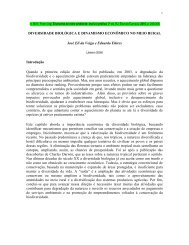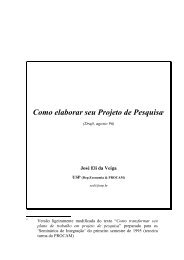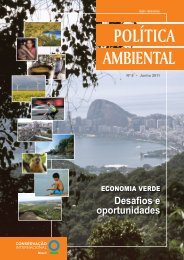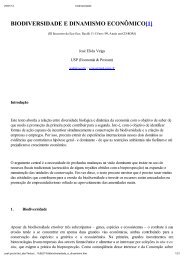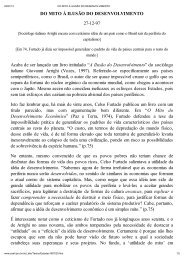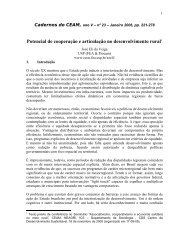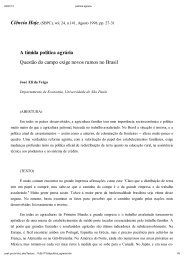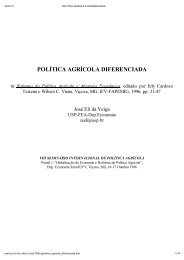sustainable development 20 years on from the ... - José Eli da Veiga
sustainable development 20 years on from the ... - José Eli da Veiga
sustainable development 20 years on from the ... - José Eli da Veiga
You also want an ePaper? Increase the reach of your titles
YUMPU automatically turns print PDFs into web optimized ePapers that Google loves.
140<br />
With regard to <strong>the</strong> safe recovery and recycling of hazardous wastes, reports <strong>from</strong> <strong>the</strong> regi<strong>on</strong>’s<br />
countries to <strong>the</strong> Basel C<strong>on</strong>venti<strong>on</strong> in <str<strong>on</strong>g>20</str<strong>on</strong>g>05 showed that ten countries had policies in effect, seven were<br />
formulating such policies, and four still lacked any such policy. Only <strong>on</strong>e country reported that it had<br />
adequate facilities to treat waste oil. The vast majority of countries in <strong>the</strong> regi<strong>on</strong> lack facilities to treat,<br />
dispose of, or recycle <strong>the</strong>se substances (OAS, <str<strong>on</strong>g>20</str<strong>on</strong>g>09).<br />
In 1992, a group of six Central American countries signed and ratified a Regi<strong>on</strong>al Agreement <strong>on</strong><br />
Transboun<strong>da</strong>ry Movements of Hazardous Wastes, based <strong>on</strong> <strong>the</strong> Basel C<strong>on</strong>venti<strong>on</strong>, banning <strong>the</strong> import and<br />
transit of waste c<strong>on</strong>sidered as hazardous <strong>from</strong> countries that are parties to <strong>the</strong> agreement to Central<br />
America. For <strong>the</strong> purposes of technical assistance, technology transfer and capacity-building, Argentina,<br />
El Salvador, Trini<strong>da</strong>d and Tobago and Uruguay are all hosting Basel C<strong>on</strong>venti<strong>on</strong> Regi<strong>on</strong>al Centres, which<br />
require <strong>the</strong> countries’ reinforcement and support.<br />
(b)<br />
Prior informed c<strong>on</strong>sent (Rotter<strong>da</strong>m C<strong>on</strong>venti<strong>on</strong>)<br />
The Rotter<strong>da</strong>m C<strong>on</strong>venti<strong>on</strong>, in force since <str<strong>on</strong>g>20</str<strong>on</strong>g>04, establishes a prior informed c<strong>on</strong>sent (PIC)<br />
procedure for imports of hazardous chemicals. The challenges facing <strong>the</strong> c<strong>on</strong>venti<strong>on</strong> include: poor<br />
administrative capacity to enforce obligati<strong>on</strong>s; weak structures for promoting harm<strong>on</strong>izati<strong>on</strong> and fostering<br />
synergy between internati<strong>on</strong>al agreements; and poor intersectoral coordinati<strong>on</strong>. This makes <strong>the</strong><br />
C<strong>on</strong>venti<strong>on</strong> ineffective as an ec<strong>on</strong>omic and regulatory instrument.<br />
Some of <strong>the</strong> proposed ways forward to resolving <strong>the</strong>se problems are: training in toxicology and<br />
risk assessment; informati<strong>on</strong> disseminati<strong>on</strong>; <strong>the</strong> establishment of mechanisms to ensure <strong>the</strong> participati<strong>on</strong><br />
and commitment of all <strong>the</strong> parties required to implement <strong>the</strong> c<strong>on</strong>venti<strong>on</strong>; involving customs more<br />
actively; securing <strong>the</strong> commitment of industry; and encouraging informati<strong>on</strong>-sharing and collaborati<strong>on</strong><br />
am<strong>on</strong>g designated nati<strong>on</strong>al authorities (M<strong>on</strong>treal, <str<strong>on</strong>g>20</str<strong>on</strong>g>07).<br />
(c)<br />
Persistent organic pollutants (Stockholm C<strong>on</strong>venti<strong>on</strong>)<br />
The Stockholm C<strong>on</strong>venti<strong>on</strong> <strong>on</strong> Persistent Organic Pollutants (POPs) has been adopted by<br />
30 countries in <strong>the</strong> regi<strong>on</strong>, 22 of which have submitted nati<strong>on</strong>al implementati<strong>on</strong> plans. 17 The regi<strong>on</strong> is<br />
progressing with banning <strong>the</strong> 12 substances covered by <strong>the</strong> Stockholm C<strong>on</strong>venti<strong>on</strong> at <strong>the</strong> outset and now<br />
faces <strong>the</strong> challenge of banning <strong>the</strong> additi<strong>on</strong>al 9 substances incorporated in <str<strong>on</strong>g>20</str<strong>on</strong>g>09. At <strong>the</strong> fifth meeting of<br />
<strong>the</strong> C<strong>on</strong>ference of <strong>the</strong> Parties to <strong>the</strong> C<strong>on</strong>venti<strong>on</strong> (COP5) held in <str<strong>on</strong>g>20</str<strong>on</strong>g>11 it was also agreed to ban<br />
endosulfan, used in such applicati<strong>on</strong>s as coffee and soybean plantati<strong>on</strong>s. The worst lags in implementing<br />
<strong>the</strong> provisi<strong>on</strong>s of <strong>the</strong> C<strong>on</strong>venti<strong>on</strong> include deficiencies in m<strong>on</strong>itoring and research capacity, final disposal,<br />
informati<strong>on</strong> disseminati<strong>on</strong> and streng<strong>the</strong>ning <strong>the</strong> legislative and instituti<strong>on</strong>al framework (Secretariat of <strong>the</strong><br />
Stockholm C<strong>on</strong>venti<strong>on</strong>, <str<strong>on</strong>g>20</str<strong>on</strong>g>09; UNEP, <str<strong>on</strong>g>20</str<strong>on</strong>g>08a). Ano<strong>the</strong>r major challenge is managing stocks of obsolete<br />
products. The Persistent Organic Pollutants Review Committee (POPRC) is also assessing a number of<br />
products, including short-chain chlorinated paraffins, used in <strong>the</strong> metal-processing industry, and<br />
hexabromocyclododecane, used in a variety of applicati<strong>on</strong>s as a fire retar<strong>da</strong>nt, with a view to banning<br />
<strong>the</strong>m under <strong>the</strong> C<strong>on</strong>venti<strong>on</strong>.<br />
While major progress has been made in terms of informati<strong>on</strong>, including inventories of dioxins,<br />
furans and polychlorinated biphenyls (PCBs), <strong>the</strong> lack or inadequacy of <strong>da</strong>ta is ano<strong>the</strong>r major barrier to<br />
implementing <strong>the</strong> Stockholm C<strong>on</strong>venti<strong>on</strong> in <strong>the</strong> regi<strong>on</strong> (UNEP, <str<strong>on</strong>g>20</str<strong>on</strong>g>08a). There are a number of projects<br />
17<br />
The nati<strong>on</strong>al implementati<strong>on</strong> plans (NIP) c<strong>on</strong>tain detailed informati<strong>on</strong> <strong>on</strong> measures taken to implement <strong>the</strong><br />
Stockholm C<strong>on</strong>venti<strong>on</strong> [<strong>da</strong>te of reference: December <str<strong>on</strong>g>20</str<strong>on</strong>g>11].



